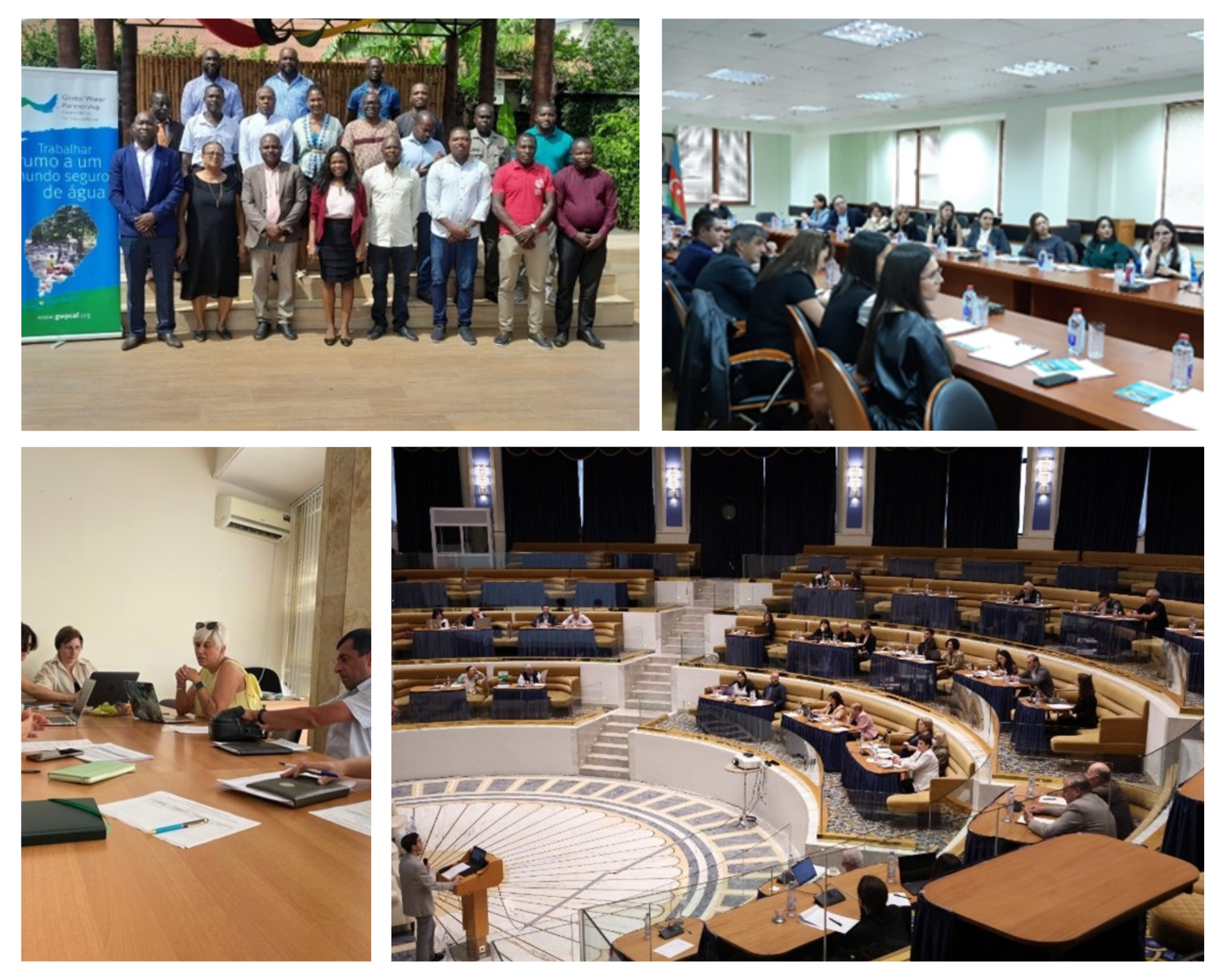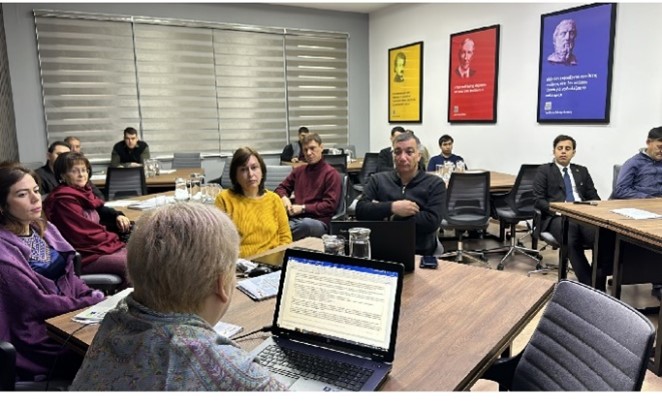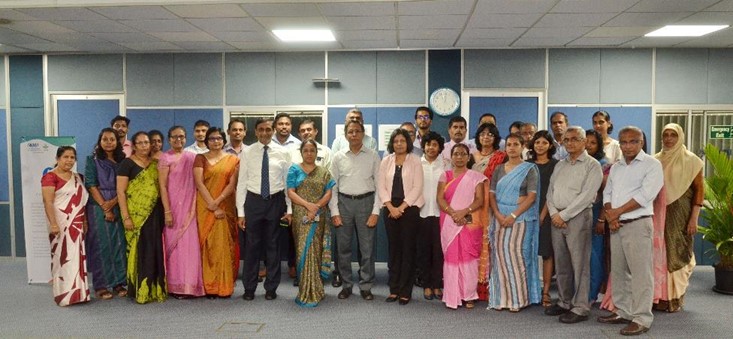Advancing water security - 2023 reporting round | Highlights from the countries | Pilot use of the online IWRM Survey tool | Leveraging support from partners | Feedback from participants of stakeholder consultations | Learn more about the SDG 6.5.1 assessment methodology | What's next
As part of efforts aiming to achieve SDG 6, in 2023, UN Member States took stock of their progress towards implementation of IWRM, through SDG indicator 6.5.1. Given the pressing need to accelerate progress, the 2023 monitoring process highlighted both the challenges countries face, but also the mechanisms through which some countries have progressed, as opportunities for cross-country learning.
Advancing water security
Under UNEP's guidance and coordinated by GWP, in collaboration with UNEP-DHI and UNDP Cap-Net, the SDG 6 IWRM Support Programme assists governments to advance water security by crafting and executing country-specific strategies for SDG indicator 6.5.1, focusing on IWRM implementation. Through a multi-stakeholder approach, it generates vital monitoring data at the country level, every three years, addressing challenges and fostering government-led processes to prioritise integrated responses. Finally, it supports implementation of identified solutions to achieve progress towards SDG 6, harnessing multiple funding sources for increased collective impact.
2023 Reporting Round

In the 2023 reporting round, the Support Programme directly assisted 67 countries in facilitating national multi-stakeholder consultations to assess and report on their progress on SDG indicator 6.5.1, as well as indirectly supporting many others.
The consultations aimed to bring together the perspectives of different stakeholder groups to provide a consensual response to the survey on SDG indicator 6.5.1, evaluating the country’s degree of IWRM implementation. The consultation process fostered inclusive stakeholder engagement and cross-sectoral collaboration, aiming to strengthen national monitoring efforts and drive tangible progress towards achieving the 2030 goals.
Highlights from the countries
Stakeholder consultation processes at the country level featured diverse opinions of the major stakeholder groups and reflected different perspectives on the key challenges towards improving the country score. Depending on the governance arrangements, countries employed different approaches to collecting stakeholder input.
Central Asia – reducing language barriers
For example, consultations in Central Asian countries aimed to first reduce language barriers and bring stakeholders to a common level of understanding prior to collecting inputs to the survey. The consultations in Azerbaijan had an extensive preparatory stage with numerous participants, which included translating all reporting materials into Azerbaijani, and concluded with an in-person workshop attended by 31 participants. This enabled participants to provide actionable inputs to the survey answers and compare the results from previous reporting rounds, as well as understanding data gaps and areas for improvement in IWRM implementation. A similar approach was followed in Armenia and Georgia, where eliminating the language barrier helped to establish trust among the stakeholders, which led to a comprehensive and well-informed discussion over a series of consultations allowing participants to deep-dive into the challenges of enhancing institutional cooperation and overcoming governance silos.

Central Africa – finance remaining a challenge
Highlights from Central African countries revealed that despite significant progress, all countries maintain a “medium-low” status of overall IWRM implementation, with finance remaining a universal challenge across all countries. The approach to data collection was somewhat similar among the Central African countries. For example, in Sao Tome and Principe, the Directorate General for Natural Resources and Energy led one-on-one data collection sessions with stakeholders, resulting in data gathered from 15 institutions. Subsequently, a national workshop was convened to validate the initial report draft, with representatives from various sectors providing input. Similarly, Cameroon's Ministry of Water Resources established a task force for data collection prior to the validation workshop to ensure wide stakeholder input. The countries are determined to address recommendations to update and implement key IWRM-related reforms to increase their chances of achieving SDG 6 by 2030.
Pilot use of the online IWRM Survey tool
In addition to facilitating Stage 1 stakeholder consultations, GWP introduced an innovative online IWRM Survey tool in 2023 to streamline data collection from diverse stakeholder groups across countries. Following the last reporting round which took place during the pandemic, where virtual or hybrid consultation modes prevailed, the demand for digital tools to facilitate consensus-building on survey scores surged. Responding to the need for such tools, GWP developed an online survey on the IWRM Action Hub in 7 languages which follows the official reporting template. This tool is freely available for stakeholders worldwide, enabling them to conduct consultations efficiently.
To date, the tool has been used for data collection by 17 countries, collecting more than 220 inputs from stakeholders globally. Government officials represent the largest stakeholder group which used the tool (59%), followed by academia and private sector.

Considering country specifics, use of the online survey varied in different countries. They have employed diverse strategies, ranging from pre-consultation dissemination of the online tool to collect preliminary data, to real-time joint scoring during consultations, and targeted invitations to specific stakeholder groups like development organisations or local government officials for input to relevant sections of the survey. Overall, feedback from stakeholders underscores the tool's user-friendliness and efficiency, with over 70% satisfied by its simplicity and speed in recording scores.
Leveraging support from partners
 The multi-stakeholder approach of the Support Programme has been recognised as a comprehensive operational tool for assessing countries’ progress towards achieving SDG 6.5.1. For example, in Turkmenistan, the consultation process was organised with the financial support of the GIZ Regional Project “Climate Risk Management in Central Asia” under the advisory and methodological assistance from the Support Programme partners – GWP, UNEP-DHI and UNDP Cap-Net. Governmental stakeholders received a specific training on the modalities of collecting data on SDG 6.5.1 and the reporting process which will allow them to better track country-level progress in between the reporting rounds. We invite other partners interested in supporting one or more countries in identifying their main water-related challenges to contact us on sdg6iwrmsp@gwp.org.
The multi-stakeholder approach of the Support Programme has been recognised as a comprehensive operational tool for assessing countries’ progress towards achieving SDG 6.5.1. For example, in Turkmenistan, the consultation process was organised with the financial support of the GIZ Regional Project “Climate Risk Management in Central Asia” under the advisory and methodological assistance from the Support Programme partners – GWP, UNEP-DHI and UNDP Cap-Net. Governmental stakeholders received a specific training on the modalities of collecting data on SDG 6.5.1 and the reporting process which will allow them to better track country-level progress in between the reporting rounds. We invite other partners interested in supporting one or more countries in identifying their main water-related challenges to contact us on sdg6iwrmsp@gwp.org.
Read more:
- The certification program for environmental and water management specialists completed in Ashgabat
- The first round of stakeholder consultations on the progress of implementing SDG 6.5.1.
Feedback from participants of stakeholder consultations
In the course of stakeholder consultations in 67 countries in 2023-2024, participants were invited to share their feedback and evaluate the inclusivity of the process and the impact of reporting for advancing IWRM implementation in their country. About 80% of respondents found that the country response to the survey helped to identify challenges for IWRM implementation on country level, while 85% of participants were satisfied with the way their opinions were reflected in the official SDG 6.5.1. survey.

Overall, more than 90% of stakeholders were satisfied with how the consultations were conducted and the opportunities to express their opinions on the state of water management in their country. These results underline the added value of the assistance provided by the Support Programme throughout the SDG 6.5.1 reporting process. Stakeholders value the facilitation of such consultation platforms by GWP’s country network, and consider it an important tool to share their opinions on the key IWRM challenges.
Eng (Ms) Namalee Madawalagama, Additional Secretary to the Ministry of Irrigation, Sri Lanka, focal point for SDG 6.5.1
“The process was important because in Sri Lanka, more than 17 institutions are working on water focusing on different subsectors. They all have their different perspectives regarding water as each and every one of them carries out service delivery to cater to various needs of the people....Whereas, in the future, that will change because, when we start talking about integrated water resource management, every aspect of water should be coordinated on one platform. An inclusive approach has to be in place to implement IWRM effectively”.
Learn more about the SDG 6.5.1 assessment methodology
 The Support Programme has developed a specific methodology to support consultations aiming to monitor IWRM implementation at the country level, which allows all interested parties to get familiar with the SDG 6.5.1 survey and techniques for engaging stakeholders.
The Support Programme has developed a specific methodology to support consultations aiming to monitor IWRM implementation at the country level, which allows all interested parties to get familiar with the SDG 6.5.1 survey and techniques for engaging stakeholders.
To make the preparatory process more interactive and accessible, the Support Programme has also developed an online course for facilitators of stakeholder consultations, hosted on the UNDP Cap-Net Virtual Campus. The course is available in English, French and Spanish. Check it out: Training of Facilitators Course for SDG 6.5.1 - Cap-Net.
What's next
The three-year monitoring cycle on SDG 6.5.1 has now concluded. The global report will be launched later this year. The Support Programme will now focus its efforts on assisting countries to turn the monitoring results into actionable pathways for accelerating progress towards the 2030 goals, and accessing the necessary technical and financial resources to boost implementation. The country results can be consulted on the IWRM Data Portal. Stakeholders consultation reports can be accessed through the Results Map.
* Photo at the top: Stakeholder consultation workshop in Sri Lanka, September 2023

